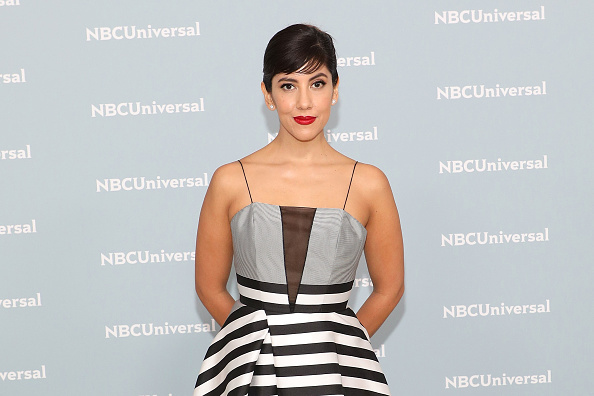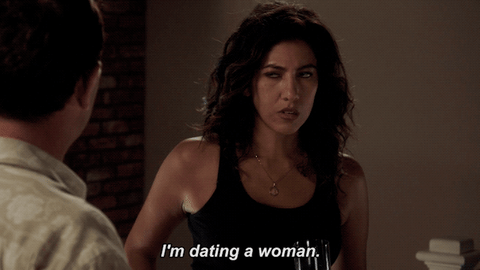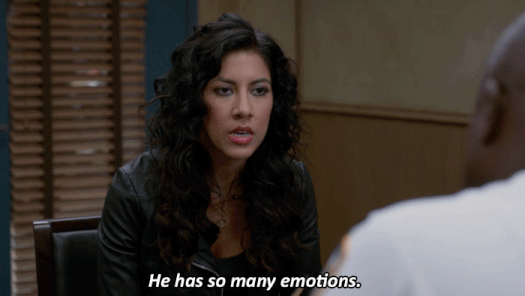
Stephanie Beatriz, who we all know stars as Rosa Diaz in Brooklyn Nine-Nine, has penned an essay for GQ about her bisexuality, writing that her impending nuptials – with a man, Brad Hoss – do not change this fundamental truth about herself. And it’s a powerful piece of writing that we would like to just excerpt repeatedly.
She opens the piece STRONG:
I’m bi, and I’m getting married this fall. I’m excited, nervous, terrified, and so fucking happy. I’m choosing to get married because this particular person brings out the best in me. This person happens to be a man. I’m still bi.
Beatriz goes on to talk about being bi as a “continual series of coming-out moments“, describing hers, and writing that the process seems endless, with people constantly wrongly assuming her sexuality or partaking in bisexual erasure. She notes that it’s hard to find positive representations of bisexual people in the media, but that she herself is using her “small platform of visibility” to talk openly about her sexuality, “because of other people who may feel invisible and unsure of whether or not to come out as bisexual“.
The centrepiece of the article is Beatriz speaking about what it means for her to marry a heterosexual man as a bisexual woman, even while she’s in the midst of figuring out how much detail she even should be giving out about herself and her sexuality.
Here’s the thing about sexual drive that some people like to deny: It’s around even after you commit to one partner. You may still want to fantasize about people, want to kiss them, to fuck them. Or maybe you do none of the above, but the kinds of people you were and are attracted to are still the kinds of people you were and are attracted to.
She then talks to her profound experience in the Pride parade in Washington DC two weeks ago – where she danced on a float with both her partner and Karamo Brown from Queer Eye. She nods to how affecting it was to be recognised, and to connect with fellow LGBTIQ+ people, including fans of her work, to whom she shouted “I see you,” and “I LOVE YOU.”
To end the essay, Beatriz says that what being out gives her is the pleasure of “living authentically“, closing with a rallying cry: “I’ll be bi till the day I die, baby, and I vow to myself to always sing that truth.”
Speaking from personal experience, it feels so fucking good to be out. It’s still scary sometimes—I feel like an outsider so often. But those moments of discomfort are worth it, because living authentically gives me so much joy and feels so honest and good. In October, I will marry a heterosexual man. We’ll make vows that I will take very seriously—till death do us part. But I’ll be bi till the day I die, baby, and I vow to myself to always sing that truth.
Thank you @iamstephbeatz for sharing your heart. We ❤️u! https://t.co/eE2ctgeNkE
— Terry Crews (@terrycrews) June 22, 2018
In the 99th episode of Brooklyn Nine-Nine, Beatriz’s character, Rosa Diaz, comes out as bisexual. It was a watershed moment for the series, but a restrained one, just a small exchange between Diaz and Charles Boyle (Joe Lo Truglio), after he spends much of the episode pressing her about who she’s dated since her ex, Adrian Pimento (Jason Mantzoukas). Ultimately he catches her having an affectionate conversation on the phone with a woman, and asks her who she’s talking to.
“I’m dating a woman,” she says. “I’m bi.”

It was important for Beatriz too – who publicly came out as queer in a super nonchalant way, off the back of Aubrey Plaza‘s profession in July 2016. She explained her feelings about the storyline to Variety when the episode first aired in December last year.
I was so excited about it because as somebody who identifies as bi – queer – I just had nothing like that when I was growing up. The gay characters I can remember were most often stereotypes… And to be able to try to do something like that on our show and have a character come out as bi was really important for me.
But what was most important was what that positive representation could mean to a young person grappling with their burgeoning sexuality.
If a kid that’s bi is watching TV and doesn’t really see anyone that identifies as bi or queer that is in a happy, functioning relationship, that has a good job, that lives past a three-episode guest star arc – or maybe the bi character is hypersexualised or possibly a villain, [which] happens a lot – what does that mean for a 12-, 13-year-old watching television and consuming media, and thinking, ‘Well who am I then? I guess I’m not this thing because I’m not a villain, I don’t want to be hypersexualised, I want what everybody wants, to live happy and well.’
Both that episode – and episode 100 which delves into Diaz’s sexuality a little more – and Beatriz’s essay have unsurprisingly hit fans POW, right in the feels.
Y’all, this was me. @iamstephbeatz, you made me feel so fucking seen that day. Thank you. #bivisibility #bisexualpride #PrideMonth pic.twitter.com/4xocWWw3no
— Lani I Been Knew About Shaun King Prunés (@blanip) June 21, 2018
being bi is very complicated & i always feel not straight enough and not gay enough simultaneously & kinda guilty if i have a crush that isn’t gay like im letting down the team anyway happy #PrideMonth! @iamstephbeatz is an angel & my crush 4everhttps://t.co/8rkzbXJveG
— girbloss (@aislina) June 21, 2018
I KNOW YOU ARE BUT WHAT AM I
— Stephanie Beatriz (@iamstephbeatz) June 21, 2018




